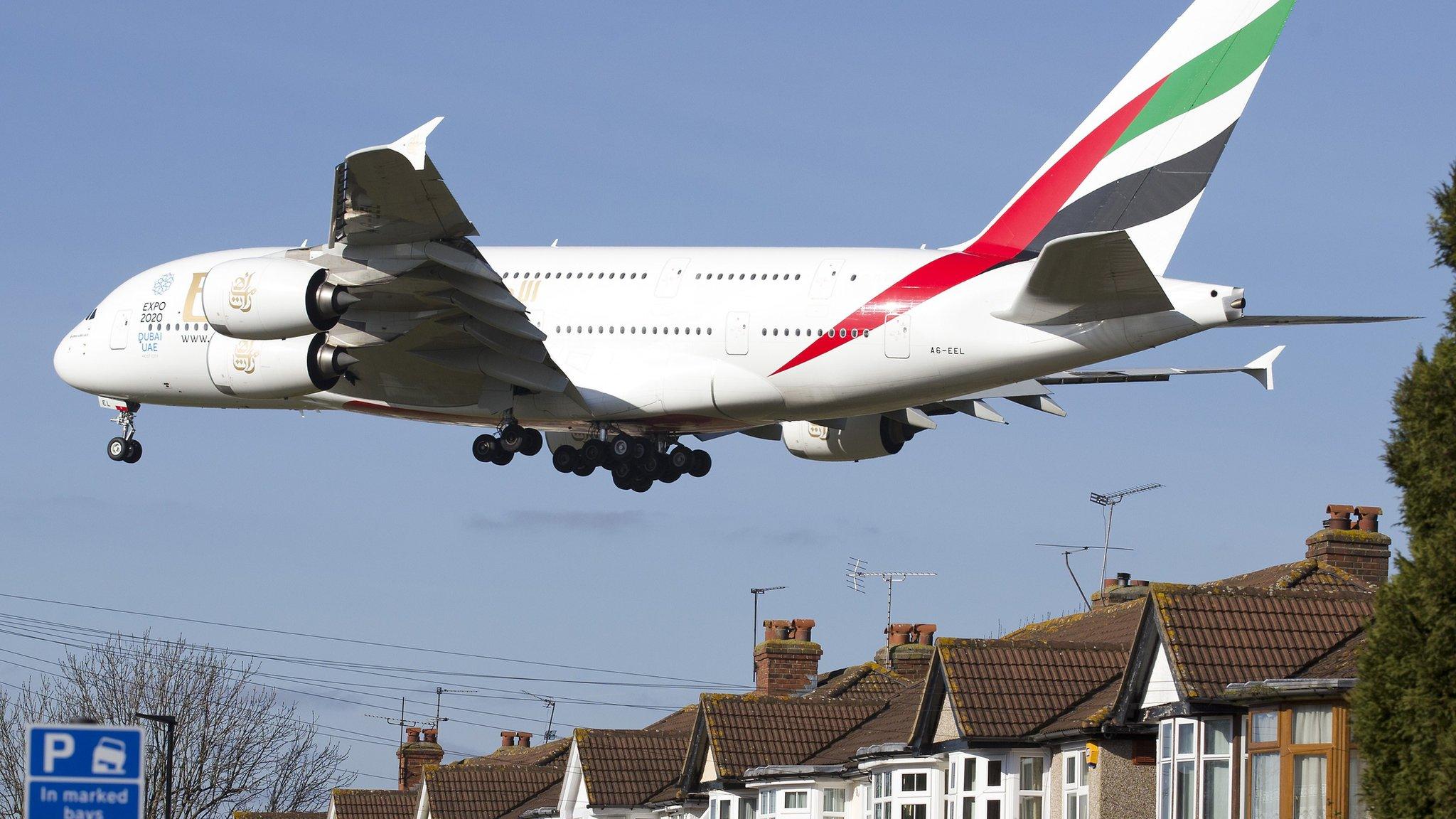Heathrow runway 'within EU pollution laws'
- Published
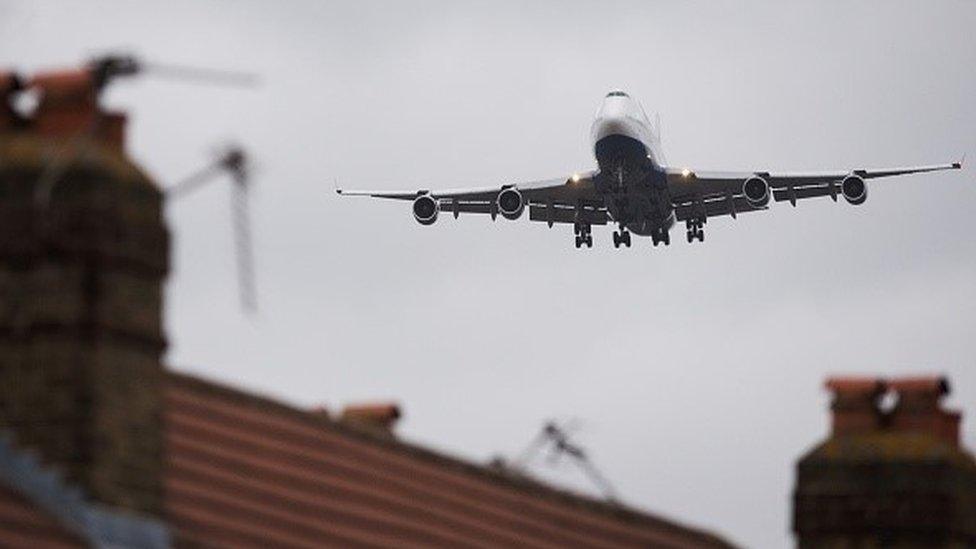
New, independent research seen by the BBC suggests Heathrow airport could build a new runway without breaking European pollution laws.
The study measured poisonous nitrogen dioxide (NO2) levels using 40 sensors in and around the airport.
It then used modelling to predict what would happen in the future.
However, the Aviation Environment Federation (AEF) said the research was "highly speculative" and there was no guarantee pollution levels would fall.
Ministers will decide within weeks whether to enlarge Heathrow or rival Gatwick and the environmental impact will play a big part in that decision.
The work was led by the University of Cambridge and has no formal links to any airport or the government.
Prof Rod Jones from the University of Cambridge told the BBC: "If there is the development of a third runway, we expect there to be a marginal increase in NO2 coming from the airport itself, but that would be against the background of reduced NO2 from other traffic, because of Euro 6 engines and electrification of the traffic fleet."
In other words, it comes down to traffic on the roads, rather than planes in the air, because that is where the bulk of the poisonous nitrogen dioxide gases come from.
As new, cleaner car, lorry and bus engines become more common, pollution levels should decline, wiping out any increase from a bigger Heathrow.
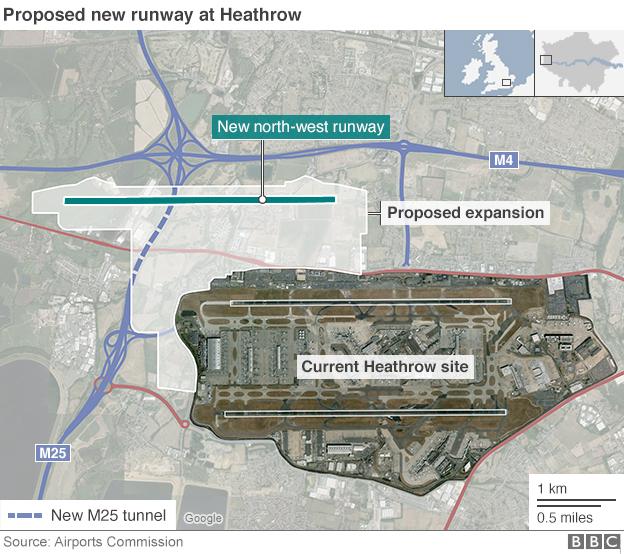
However, Cait Hewitt, deputy director of the AEF, said that the plan was for the third runway to be operational by the 2020s.
"The assumption would have to be that over the next decade, we'd move from having something like 57% of London's vehicles fleet being diesel vehicles to instead having ultra-clean electric vehicles throughout the capital. There just isn't evidence to suggest that's going to happen," said Ms Hewitt.
Sensor network
Prof Jones said using lots of smaller sensors, dotted in hard to reach places, gave them a clearer picture of what was going on.
"By deploying a network of sensors we can tell directly from the measurements, what's been emitted locally from Heathrow airport and what's been blown in, mostly from central London. That's the real strength of the sensor network," he said.
"The major result from this study is that we have tested the models far more critically than you can from a single measurement site."
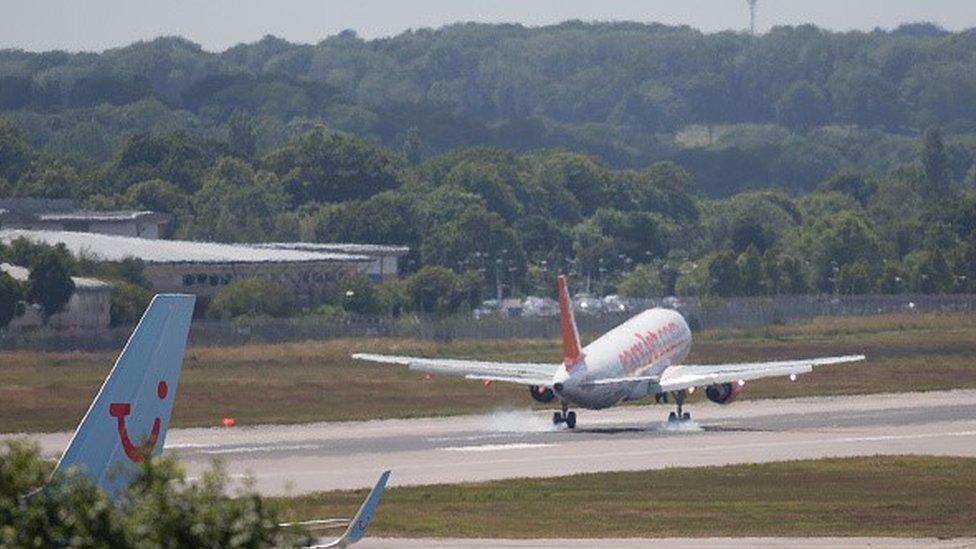
Expansion at Gatwick is one of the other options on the table
Currently, the air has climbed above European health limits at several sites near Heathrow. This work suggests that as cleaner engines kick in levels will fall again.
It is a conclusion that tallies broadly with previous research for the government, external, but that research relied on estimates, whereas this latest work used more accurate, real-world measurements.
Opponents think air quality is the Achilles heel for Heathrow expansion and could be where it is challenged in the courts. That is what happened the last time they, external wanted to build a third runway.
Keith Taylor, who is a member of the European Parliament's Transport committee and the Green MEP for the South East of England, told the BBC:
"It is entirely speculative to suggest that any assumed reduction in traffic pollution will offset airport expansion.
"The air pollution crisis in the UK responsible for the deaths of an estimated 50,000 people every year, a responsible government would not entertain the idea of endorsing a project that, as the report makes clear, will increase the toxicity of the air we all breathe.
"We need to be striving for the lowest emissions possible, not try to squeak in just under the European targets, by relying on over-optimistic traffic predictions. The right number of new runways is zero".
Decision due
Airport expansion has been shoved under a carpet in Downing Street for decades, but now the Conservatives say they want to get on with it.
The current "hot date" for a decision is 18 October, but it could change.
Picking Heathrow would put the cat among the pigeons, because a number of high-profile ministers, including Foreign Secretary Boris Johnson and Education Secretary Justine Greening, are against the scheme. Chancellor Phillip Hammond has also favoured Gatwick in the past. , external
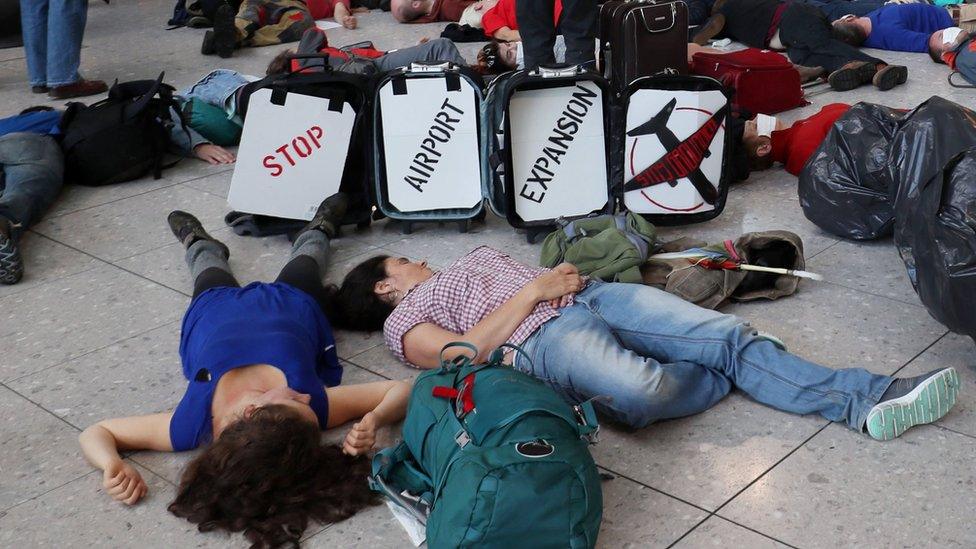
Many protesters are opposed to further expansion at Heathrow
Prime Minister Theresa May could give her MPs a free vote on the issue to avoid anyone having to resign.
Interestingly, Mrs May's constituency sits under the flight-path but it's hard to find her openly opposing expansion. Opponents at the Heathrow Association for the Control of Aircraft Noise managed to dig out this, external from her website on May 2010, when the coalition came in and cancelled Labour's third runway scheme. It's not on the website now, they had to use a special archiving service to find it.
Ms May said at the time: "Like many local residents, I strongly welcome [the] cancellation of the third runway at Heathrow. Expanding Heathrow in this way would have had a detrimental effect on the Maidenhead and Twyford areas by increasing levels of noise and pollution, and today's announcement is a victory for all those who have campaigned against it."
Her predecessor David Cameron painted himself into a corner over the issue in the run-up to the 2010 election, when he said he would never expand Heathrow if he became PM.
Ministers still have three options: a third runway at Heathrow, a second at Gatwick, or a third scheme that would double the length of one of Heathrow's existing runways.
Government silence
This latest, million-pound research was funded by the Natural Environment Research Council and alongside Cambridge, experts from the universities of Manchester and Hertfordshire, Imperial College London, CERC Limited and the National Physical Laboratory were involved.
Heathrow helped them put the sensors up and British Airways provided some flight data, but neither handed over any money or were involved in the actual work.
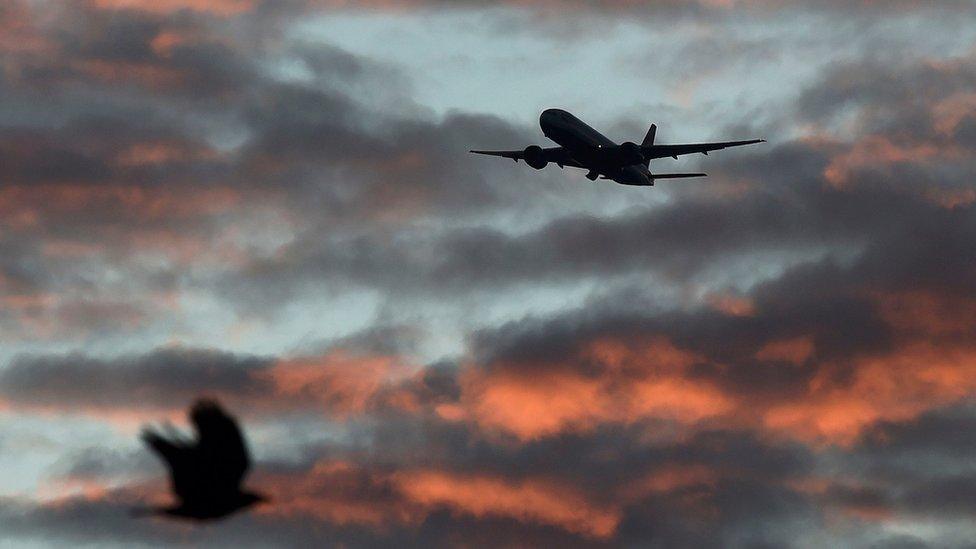
A decision on whether to expand Heathrow could come on 18 October
Last December, the government told the BBC it had to go away and double-check a few things before making a decision, claiming it was "subject to further consideration on environmental impacts and the best possible mitigation measures". , external
I have asked, but they won't tell me what they've been checking for nigh on a year. And I'm not the only one.
Ravi Govindia, leader of Wandsworth Council, told the BBC: "We have repeatedly asked for information on the government's latest investigation in airport expansion, but they seem to be operating in secret.
"Our concern is that Heathrow is being consulted on this work while communities surrounding the airport are kept in the dark. Years of detailed analysis have shown that expanding this airport is unlawful and undeliverable."
'Quick decision'
Mr Govindia, and plenty of other opponents, argue there's a plane-load of good reasons to biff the Heathrow plan. This study concentrated on NO2, but there are lots of other nasties in the air, then there's the noise, local congestion, cost to the taxpayer from rebuilding the roads, possible air fare rises to pay for it all, and so on and so on.
Even if the government does make a "quick" decision, that is just the start of it. Labour backed Heathrow expansion in 2008, but the plan was ditched by the incoming coalition government.
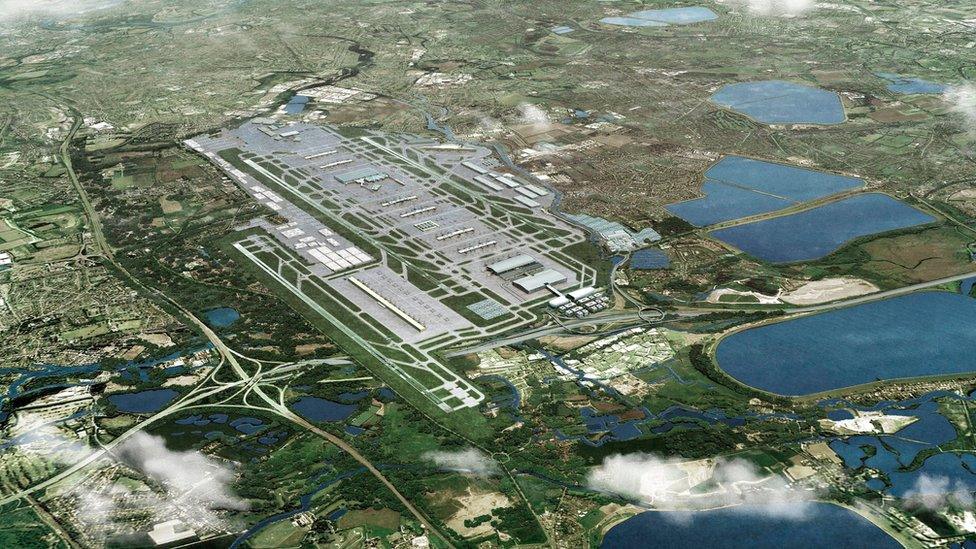
An artist's impression of how the airport could look with a third runway
Whichever scheme they pick will meet loud, angry resistance.
Meanwhile in Montreal, the airline industry is inching towards what would be a historic first global deal to curb greenhouse gases. The International Civil Aviation Authority is being asked to agree for the first time that the rise in emissions from aircraft is mostly capped from 2020.
Aircraft would be made more efficient and any extra emissions would be offset by, say, planting trees. Scientists welcome the fact that the industry will face targets, but say they are not tough enough.
- Published2 October 2016
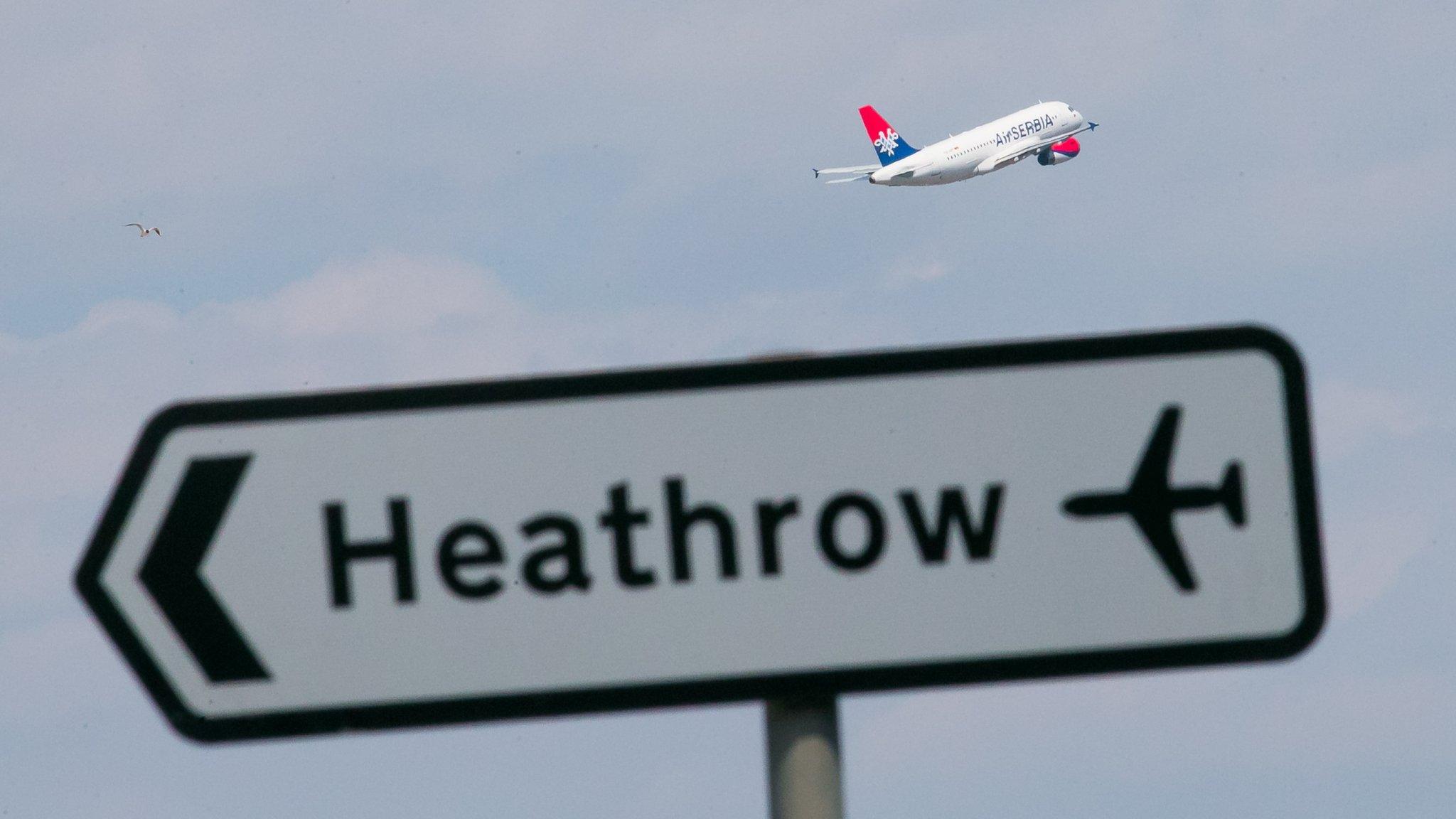
- Published10 September 2016
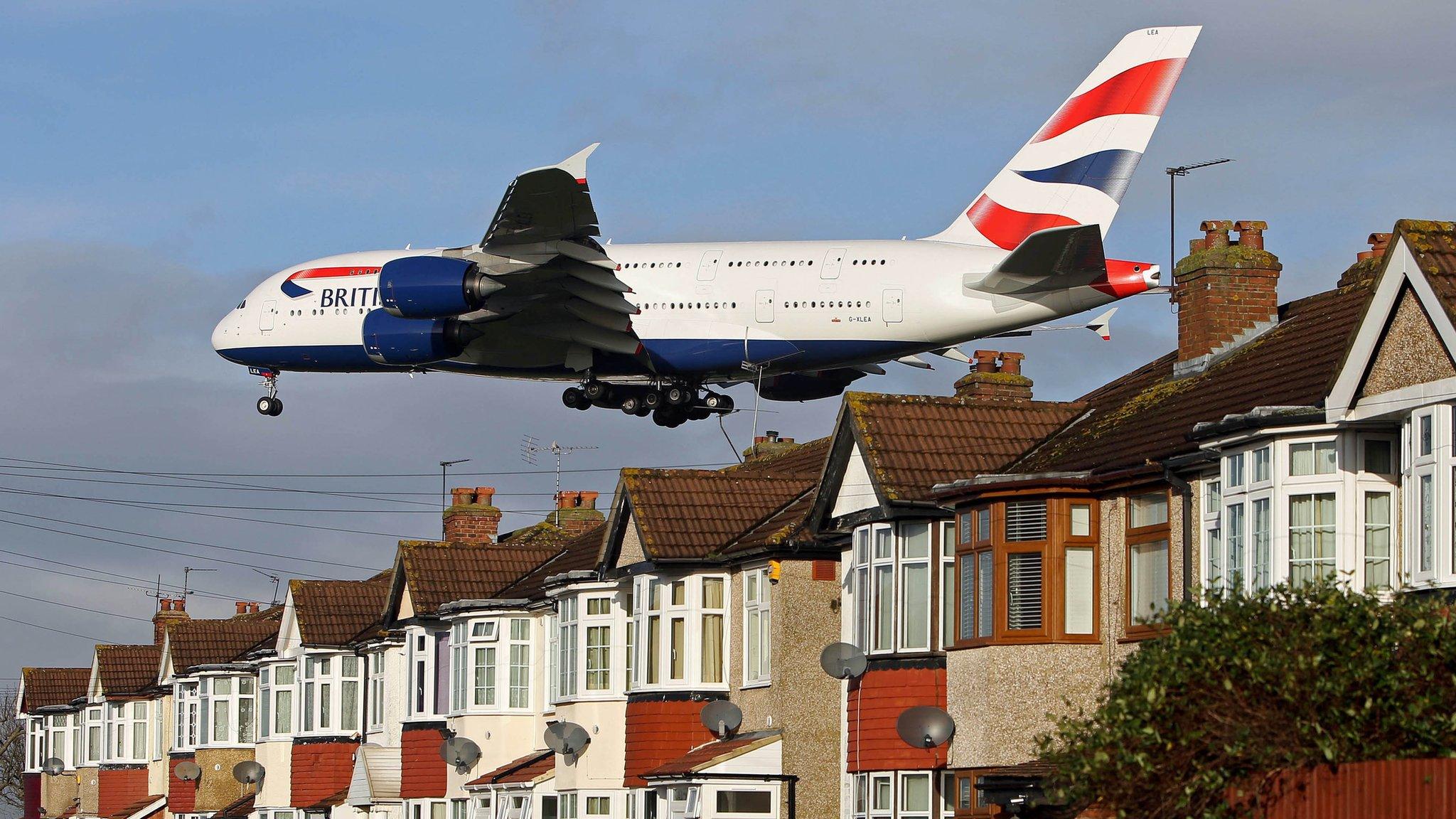
- Published25 October 2016
